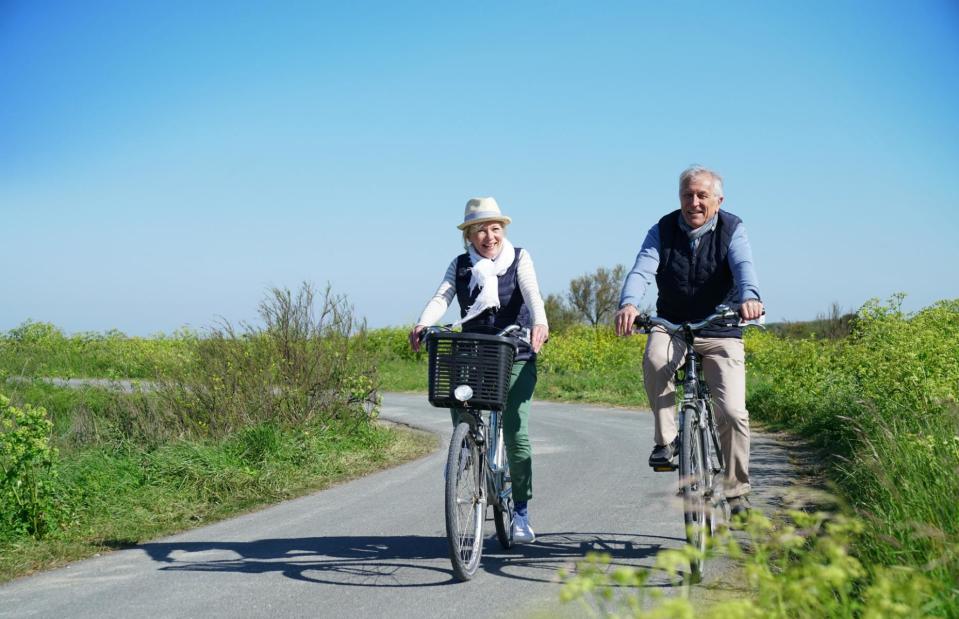Are Brits retiring earlier than their compatriots in other countries?
How do average retirement ages compare globally?

oneinchpunch / Shutterstock.com
The official age of retirement is slowly creeping upwards in most countries, with governments trying to strike a balance between stretched public finances and supporting their older population. But while many governments want people to work until they're 67, the age that people are actually retiring at is often lower than you might expect.
Using the latest data from the Organisation for Economic Cooperation and Development (OECD), unless otherwise specified, read on to find out which rich countries have the highest and lowest retirement ages.
South Africa: 59.55 years

Monkey Business Images / Shutterstock.com
The average South African will retire shortly before turning 60.
The government doesn't impose an official age as such, so it's left to employees to liaise with employers to find an "agreed" age of retirement. That said, the Government Employees Pension Fund (GEPF) does provide for specific retirement ages, starting from 55 years.
Türkiye: 60.85 years

Alexandros Michailidis / Shutterstock.com
Türkiye doesn't have a specific retirement age, with President Erdogan eliminating the previous retirement ages of 60 for men and 58 for women in December 2022.
Instead, a worker's retirement eligibility is now calculated based on the length of their social security-registered working life, a move which enabled over two million Turkish employees to retire immediately after Erdogan's announcement.
The average man in Türkiye retires at 61.5 while the average woman retires at 60.2, giving an overall average of 60.85.
Belgium: 61.2 years

oneinchpunch / Shutterstock.com
Belgian men and women officially retire at 65, though most retire several years before that thanks to early retirement schemes. The average effective age for men is 61.1 years old, while women – somewhat unusually – tend to leave work later, at 61.3.
According to OECD data, around 30% of the Belgian population is over 65, slightly higher than the European average of 28%.
In an apparent effort to capitalise on this subsection of society, the retirement age was supposed to increase to 66 by 2025 and 67 by 2030 – measures that proved highly unpopular when they were introduced in August 2015.
However, additional reforms announced in January last year will see Belgium's retirement age scrapped altogether. Instead, a citizen's ability to retire will be calculated based on the length of their career, with people required to work for 42 years before they can draw their state pension.
Austria: 61.25 years

FamVeld / Shutterstock.com
The official pension age in Austria is 60 years for women and 65 for men.
Austrian women tend to work for slightly longer than this and will typically retire at the age of 60.9, while men leave work earlier and retire at 61.6, giving an average effective retirement age of 61.25.
The retirement age for women is set to gradually increase to 65 between this year and 2033.
Greece: 61.45 years

LOUISA GOULIAMAKI / AFP / Getty Images
On average, Greek men retire at 63.2 years old, while Greek women stop working at 59.7. It was little wonder that authorities sparked protests when they raised the official retirement age by two years to 67 in 2012.
The age increase was part of austerity measures introduced after the country was bailed out by other European nations due to its debts. Some creditors across the continent resented helping the Greek government when many citizens were drawing pensions in their 50s.
France: 61.45 years

goodluz / Shutterstock.com
In France, men retire at an average age of 60.7 while women retire at an average age of 62.2. As in Greece, this results in an average age of 61.45.
Retirement age continues to be a contentious issue in France. Back in 2019, Prime Minister Édouard Philippe attempted to incentivise people to continue working until the age of 64, causing months of strike action by protestors.
Last year, workers went on strike again when then Prime Minister Élisabeth Borne announced proposals to increase the retirement age by three months each year, starting that September, with the goal of reaching 64 by 2030. Surveys have shown that around 80% of French people oppose the idea.
Spain: 61.95 years

JOSEP LAGO / AFP / Getty Images
The official retirement age in Spain – whose residents have one of the highest life expectancies of anywhere in Europe at 84.1 years – is being gradually increased from 65 to 67 between now and 2027. However, on average, Spanish people typically retire at the age of 60.7 years, with men retiring at 62.1 and women at 61.8.
Like most European governments, the Spanish government has been under pressure to carry out pension reforms to qualify for EU post-pandemic recovery funds. Unions threatened to strike over the age increase but caved in after the government said workers could still retire at 65 if they had made at least 37.5 years’ worth of contributions.
For workers with contributions that are less than this amount, their retirement age will be 67 by 2027.
Latvia: 62.45 years

OlegRi / Shutterstock.com
In Latvia, the official state pension age is 63.8, although the average Latvian man retires at 61.7 while the average woman retires at 63.2. This means the nation's average effective retirement age is 62.45 years.
At around 73 years old, Latvia has one of Europe's lowest life expectancies. This could explain why the effective retirement age has fallen in recent years; according to previous OECD data, Latvia used to have the third-highest effective retirement age of any OECD country.
Italy: 62.5 years

Andrew Balcombe / Shutterstock.com
The average age men retire in Italy is 63, while women typically work until they're 62.
In 2011, the Italian government tried to save money by proposing that people retire at the age of 67. More recently, the coalition government of the anti-establishment Five Star Movement and far-right League Party controversially reversed the planned increase, and the official retirement age listed by OECD is 62.
It's possible for people to take early retirement as long as they've paid contributions for 42 years and 10 months (men) or 41 years and 10 months (women).
Poland: 62.7 years

Vladyslav Horoshevych / Shutterstock.com
Bucking the global trend, the Polish government slashed its retirement age from 67 to 65 for men and 60 for women in 2017.
The move from the right-wing Law and Justice Party proved popular with voters, especially after the previous government had increased the retirement age in 2012. The new retirement age reflects reality as most Polish men actually work until they're 64.2 years old, whereas the average Polish woman will stop working at the age of 61.2 years.
UK: 63 years

I Wei Huang / Shutterstock.com
The retirement age in the UK is currently 66, though men typically retire at 63.2 years old on average, while women finish slightly earlier at 62.8.
Women also saw a controversially steep rise in their pension age from 60 to 65 in 2018, and both sexes saw the state pension age increase to 66 in October 2020.
There are plans to increase the official retirement age to 68 by 2046. However, the OECD data shows that the average effective retirement age is falling year-on-year.
Germany: 63.55 years

Sean Gallup / Getty Images
German men tend to retire at 63.7 years old, while German women retire slightly earlier at 63.4. These ages aren't too far off the official retirement age of 65.7 – but this is creeping up.
The country is in the process of raising the retirement age to 67 for those born after 1967. According to a 2021 report from Germany's Federal Ministry of Economics' advisory council, this is partly to tackle "shocking increases in financing issues for the statutory pension system from 2025 onwards".
The report suggested raising the retirement age to 68 by 2042, although there's currently no sign this will be adopted.
Norway: 63.65 years

Aleksandra Suzi / Shutterstock.com
Norway’s state pension age has been 67 for men and women since the 1970s. Despite this, most men stop working at the age of 64.9 years, while women retire even earlier at 62.4 years.
Nowadays, the retirement age is flexible for earnings-related pensions, which Norwegians can draw from as early as the month after their 62nd birthday.
While some experts have suggested it may be time to gradually increase the retirement age, there are no confirmed plans to do so.
Finland: 63.75 years

Shutterstock
Finnish men and women can officially retire at 65, although there are significant financial incentives if they keep working into their late 60s. That said, the average Finnish worker retires at 63.3; that's 63.7 years for men and 63.8 years for women.
According to information published by the Finnish Centre for Pensions, the retirement age gap between men and women is widening. The research shows that the working life expectancy for men has increased by 4.2 years since the 2000s, while the working life expectancy for women has increased by 6.5 years over the same period.
Denmark: 64.15 years

JOHN MACDOUGALL / AFP / Getty Images
The official age that Danish men and women can retire from is 66. According to a previous reform, the state pension age in Denmark was due to increase to 67 in 2022 and 68 in 2030, but these plans have since been modified, with the most recent increase abandoned.
As a result, twice as many Danes were expected to reach state pension age in 2023 than in previous years. In reality, the average Danish man retires at 64.5, while the typical Danish woman retires at 63.8 years.
Interestingly, the Danish pension system has been rated the third best in the world by the 2023 edition of the Mercer CFA Institute Global Pension Index.
Canada: 64.2 years

David P. Lewis / Shutterstock.com
Canadians can draw a means-tested state pension from 65 if they've lived in the country for 40 years. The system is flexible though, with workers able to take less money from the age of 60, or an increased pension if they delay it until their late 60s.
The average age is slightly below the official one, with men retiring at 64.9 and women retiring at 63.5, putting the overall retirement age at 64.2 years.
The previous government had planned to delay retirement until 67 from 2023, but current PM Justin Trudeau scrapped the measure.
Switzerland: 64.3 years

Balakate / Shutterstock.com
In Switzerland, the average effective retirement age is 64.6 years for men and 64 for women, making an overall average of 64.3. This sits roughly in line with the official retirement age of 65 for men and 64 for women.
However, like Canada, the Swiss state offers a flexible pension age, and pensions can be drawn much earlier but with lower entitlements. They can also be accessed up to five years later, with bigger payments.
Netherlands: 64.45 years

Andrew Balcombe / Shutterstock.com
Men and women in the Netherlands can currently give up work when they reach the age of 66 and four months old. However, the real average age that Dutch people retire at is actually lower, at 64.45 years old (65 years for men and 63.9 for women).
Despite this, the government is set to gradually increase the official retirement age to 67 by the end of this year, amid concern over the costs of an ageing population. The government is also trying to incentivise citizens to work longer, with higher contributions for those still employed above pension age and bonuses for the employers who hire them.
As a result, the Netherlands has the sixth-highest employment rate for 55-64 year-olds in the world, according to OECD data.
Australia: 64.75 years

Simona Pillola 2 / Shutterstock.com
The Australian government increased the official pension age in 2017. People born before 1952 can retire at 65.5, but those born after that face gradual increases. As it stands, people born after January 1957 now have to wait until 67 to retire.
The Liberal Party previously tried to increase the retirement age to 70, but this idea was scrapped when other parties shied away from an even bigger hike.
So when does the average Australian actually step back from work? Men retire at 65.1 years old on average, while women stop working at 64.4, making the average retirement age 64.75 years.
Sweden: 65 years

JONATHAN NACKSTRAND/AFP/Getty Images
Swedish citizens can draw their means-tested state pension at the age of 63 thanks to the country's flexible earnings-related scheme, although the guaranteed pension age went up to 66 last year.
This will likely only have a limited impact on many Swedes, as the average age of people leaving the workplace is already 65 years. Men typically retire at 65.5 years, while women exit the workplace at the age of 64.5.
USA: 65.25 years

Shutterstock
In America, anyone born between 1943 and 1954 can retire at 66, while those born after 1960 have to work until they're 67. The retirement age will increase gradually up to 67 for those born in between.
However, on average, American men retire at 65.2 years, while women retire at 65.3. According to a Forbes report, the real retirement age has decreased slightly due to the COVID-19 pandemic.
General confidence in the retirement system is also declining. The Wall Street Journal revealed in April 2023 that just 64% of workers think they have enough money to live comfortably through retirement, down from 73% in 2022.
Chile: 65.5 years

Karol Moraes / Shutterstock.com
In Chile, the average man retires at the age of 67.3 years, while the average woman retires at 63.7. This makes the country's mean retirement age 65.5, slightly higher than the official pension age of 65 for men and much higher than the official age for women (women's official retirement age is usually listed as 60, although it's worth noting they're not entitled to their full pension until they're 65).
In 2019, there were protests over the Chilean pension scheme, with retirees who were once promised more than 70% of their salaries in their golden years struggling to make ends meet.
More recently, the problem has been compounded by the government's policy of allowing residents to withdraw money from their pension pots to help them weather the COVID-19 pandemic, which could plunge the country into financial chaos in the years to come.
Ireland: 65.6 years

EML / Shutterstock.com
Men and women in Ireland can draw their pension from 66, with most men retiring once they turn 66.3. Women typically leave work slightly earlier, retiring at 64.9 years on average.
The retirement age was due to rise to 68 from 2028, which would have made it one of the highest in the world. However, this measure was scrapped until further notice back in 2020.
Portugal: 65.6 years

Szymon Mucha / Shutterstock.com
The typical Portuguese man will retire at the age of 66.6, while women leave work at 64.6 years.
Officially, men and women get their pension by the age of 66 years and four months, although the OECD anticipates this figure will rise to 68.4 years by 2050
The retirement age was increased in 2017 due to an ever-increasing national life expectancy and the pressure to save money after the country received an international bailout in 2011.
Mexico: 66.25 years

Rusland Iurchenko / Shutterstock.com
Mexico’s official retirement age is 65 for both men and women. In reality, the typical man leaves work at 66.9 years, while the average woman works until she's 65.6, giving an average age of 66.25.
It's possible for workers to retire early between the ages of 60 and 64, though not everyone will find this easy.
According to a 2021 article in The Economist, an estimated 38% of elderly Mexicans are officially considered "poor", with less than half having a pension due to working in casual employment without access to state-backed retirement funds.
Israel: 66.25 years

Lerner Vadim / Shutterstock.com
On average, people in Israel work until they're 66.25, with men working until they're 66.5 and women until they're 66.
This is different from the official ages set by the government, which currently states that men can retire at 67 and women at 62.
However, politicians are working towards narrowing the gap between men and women. In 2021, Israeli lawmakers passed a motion that will gradually increase women's retirement age from 62 to 65, with annual four-month increases between 2022 and 2024, followed by further increases of three months a year from 2025 to 2032.
New Zealand: 66.4 years

ChameleonsEye / Shutterstock.com
There's no official retirement age in New Zealand, although pension payments start at the age of 65. On average, both men and women work beyond that age, with men retiring at 67.3 years and women at 65.5.
There are also plans to raise the pension age to 67 in the late 2030s. The residency rules to qualify for a state pension are also expected to change, with future retirees required to have lived in the country for at least 20 years rather than 10 as previously.
Iceland: 67.05 years

BMJ / Shutterstock.com
Icelandic men and women have some of the longest life expectancies on the planet – though they also have to work until they're 67, with their full pensions based on at least 40 years’ residency in the country.
The retirement age is slightly younger for public sector workers, who can leave the workforce at 65.
Most men actually stop working at 68.3, while the average woman works until she's 65.8, resulting in an overall average retirement age of 67.05 years.
Japan: 67.65 years

maroke / Shutterstock.com
It's not surprising that Japan's citizens work until they're 67.65 years old on average, despite the official retirement age being 65. After all, the nation has one of the highest life expectancies in the world – not to mention one of the oldest populations.
Japanese men typically work until they're 68.3 years old, while the average woman will retire at 67 years.
In a bid to save money during the COVID-19 pandemic, the number of companies in Japan offering early retirement plans doubled during 2020, with a study by Tokyo Shoko Research finding that some businesses were even considering people in their 20s and 30s to be eligible.
This trend has continued, with at least 80 listed companies offering voluntary early retirement programmes in 2021 and 2022.
Now discover the best countries for retirees in 2024

 Yahoo Finance
Yahoo Finance 